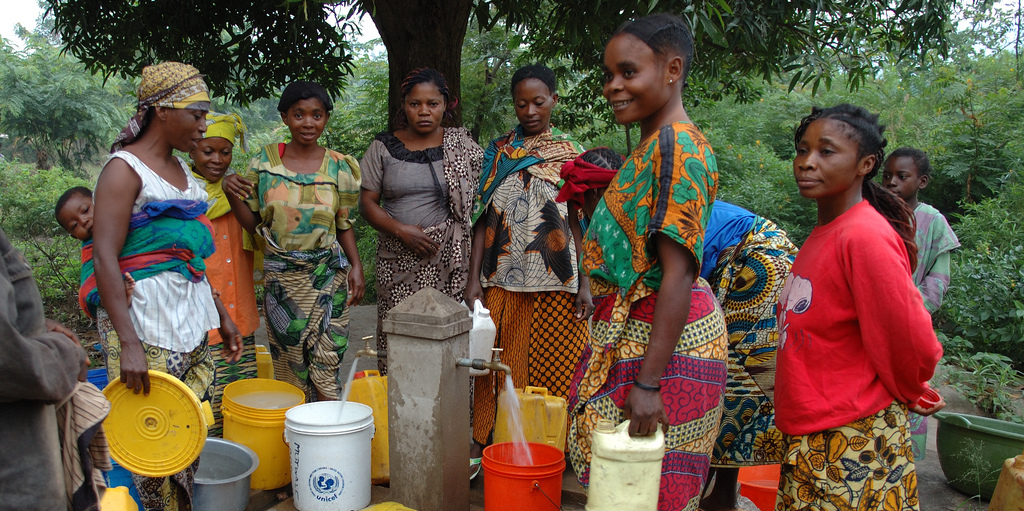
March 22, 2013, by ICCSR
A University of Nottingham alumnus shares some thoughts for World Water Day.
Some thoughts today, this 20th anniversary of World Water Day, from snowy Nottingham…..
In 1832, Nottingham was hit by an outbreak of cholera…”… there were 930 attested cases and 330 deaths. It was generally agreed at the time that the lower parts of the town had been the worst affected and that the higher streets, built on porous sandy rock, had been almost immune. It might be supposed that such a calamity would have driven home the obvious inference that the drainage and ventilation of the houses in the lower part of the town required attention; the town fathers, however, contented themselves by acquiring new burial grounds”*
150 years later the conditions of people living in slums in Nairobi, Lagos or Dhaka are similar to those that used to occur in Broadmarsh. 783 million people still do not have an improved water supply and 2.5 billion lack adequate sanitation**. The impacts go beyond disease, disrupting economies, damaging the environment and creating social unrest. We do know how to prevent diseases such as diarrhoea cholera and malaria but the rate of progress, especially on sanitation, is slow, with climate change, rapid urbanisation and poor governance all impacting on progress and adversely affecting the lives of the poorest in society.
2013 is the International Year of Water Co-operation and improved cooperation can solve much of this crisis. The solutions to many of the problems related to improving access to water and sanitation are known, however knowledge needs to be shared more widely, and the skills and expertise of local staff developed.
As my final MBA project last year, I carried out a strategic review of knowledge sharing and capacity development opportunities within the water and sanitation sector. After discussing findings with key sector stakeholders, I am in the exciting position of taking forwards my recommendations. I am organising the latest in a series of international conferences focussed on the sharing of practical experience and developing capacity on the ground in Kenya. The conference is not just for engineers as capacity is also needed in areas such as project and financial management, human resource management and communications; so all of these which will be discussed, alongside the engineering. We will welcome around 400 participants from 60 countries, providing a platform for valuable debate between Civil Society, Government, the Private sector and academia.
It is hugely rewarding for me to be able to make a practical contribution in an area I am passionate about. Come and join us, or learn more here: http://www.wedcconference.co.uk/index.html
*Chambers J D quoted in McDonald, J. D. “Looking back” : environmental health in Nottingham, 1847-1983 Nottingham City Council, Environmental Health Dept Nottingham UK 1983
**http://www.wssinfo.org/data-estimates/introduction/
By Anne Blenkinsopp, WEDC, Loughborough University and alumnus of the Executive MBA in CSR at the ICCSR, Nottingham University Business School
——-
Photograph taken by Julien Harneis reproduced under creative commons license CC BY-SA 2.0 source http://www.flickr.com/photos/julien_harneis/659111990
Repatriated Mamas at the fountain
Cholera has been endemic in Baraka over the last years. Lake Tanganyika may act as a reservoir for the bacteria. Years of war and absence of government had destroyed the water system and returning refugees had dangerously overcrowded Baraka. From here the bacteria spread along the roads up the coast and in land causing smaller epidemics in Lulimba, Kilembwe and elsewhere.
Late last year UNICEF and www.acted.org with a local NGO CHR and the local water authority started the construction of a 30km piped water system bringing water down from the hills with water fountains across the town. It provides more than 30,000 people with drinking water. Cholera has all but disappeared. MSF is closing down their Cholera Treatment Centre due to lack of patients. Cholera has significantly reduced throughout the territory of Fizi. It has the additional benefit of reducing the distances women and child have to carry 20kg jerricans of water.
No comments yet, fill out a comment to be the first

Leave a Reply